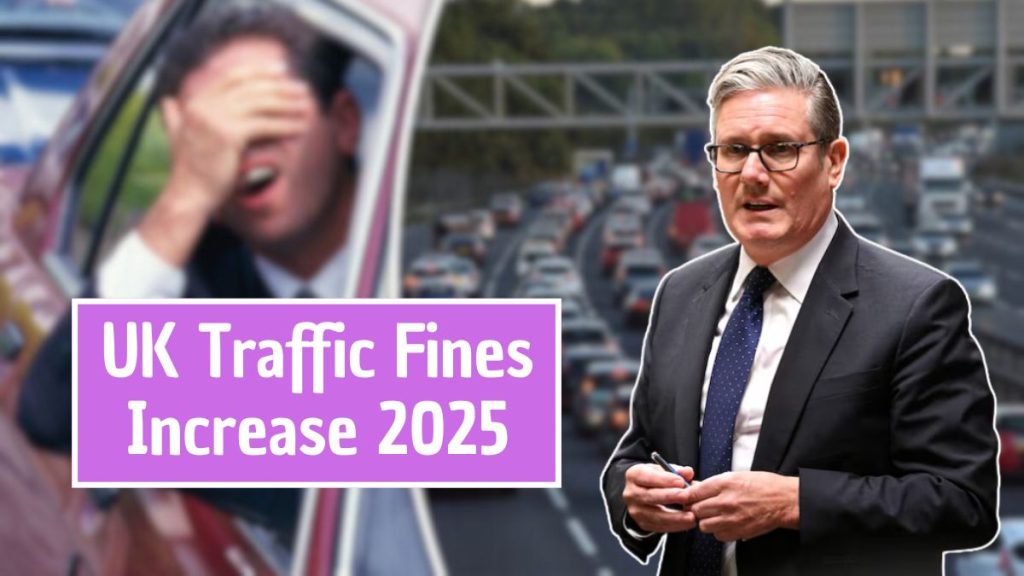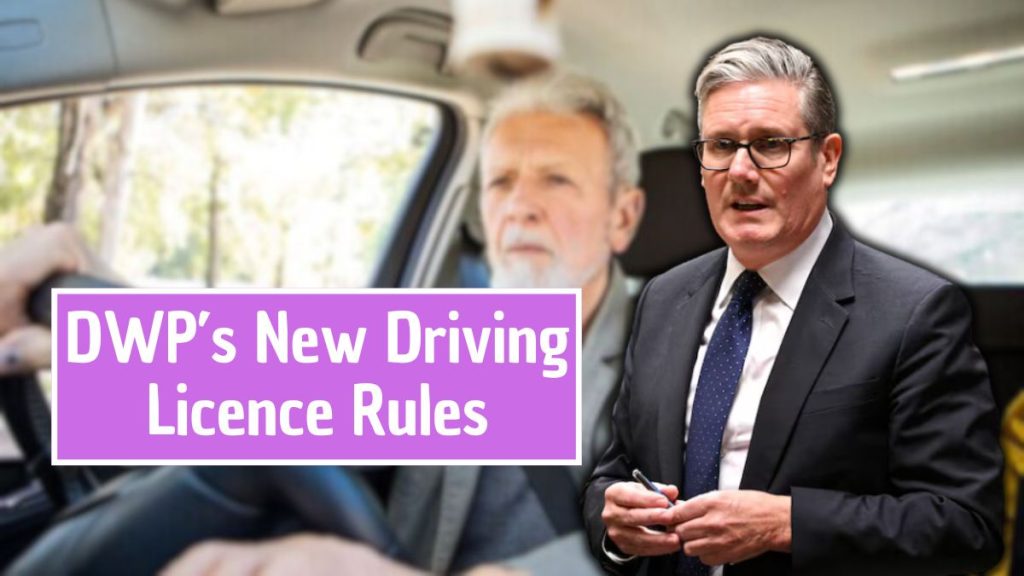The UK government has officially announced sweeping changes to traffic fines and penalties, set to take effect in September 2025. This is being described as one of the biggest overhauls of road safety laws in years — and it affects every driver, including those using electric vehicles and e-scooters.
The reforms come amid growing public concern about reckless driving, speeding, and distracted motorists, particularly due to the rise in mobile phone use. With stricter fines and tougher consequences for repeat offenders, drivers will need to adapt quickly or face serious financial and legal repercussions.
Why the UK Introduced Stricter Traffic Fines

Road safety has remained a key concern for the Department for Transport (DfT), with data showing that speeding and mobile phone distractions are now among the top causes of road accidents and fatalities in the UK.
Government statistics reveal that:
- Speeding remains the leading cause of fatal crashes.
- Mobile phone use while driving has increased significantly with smartphone dependency.
- Careless and dangerous driving continues to climb, particularly in urban areas.
- E-scooters and electric vehicles (EVs) have created new challenges for enforcement.
The 2025 fine reforms aim to:
- Deter reckless driving through higher penalties.
- Modernize outdated laws to address new forms of transport.
- Reduce hospital admissions from road accidents.
- Hold repeat offenders accountable with harsher punishments or rehabilitation courses.
Quick Overview: UK Traffic Fine Changes 2025
| Aspect | Details |
|---|---|
| Authority | UK Department for Transport |
| Effective Date | September 2025 |
| Key Updates | Higher fines, more penalty points, stricter rules for repeat offenders |
| Offences Covered | Speeding, mobile phone use, drink/drug driving, seatbelt, EV & e-scooter misuse |
| Maximum Fine | Unlimited (for dangerous driving cases) |
| Official Website | gov.uk/traffic-offences |
1. Speeding Offences – Fines Increased by 20%
Speeding remains the most common traffic violation in the UK. Starting September 2025:
- The standard fine for speeding will increase by 20%.
- The maximum fine for motorway speeding will rise to £2,500.
- Repeat offenders may face mandatory driving courses or temporary license suspensions.
Authorities are also expected to deploy more speed cameras in urban and rural areas to catch offenders in real-time.
2. Mobile Phone Use While Driving – £400 Fine and Six Penalty Points
The government has taken a zero-tolerance stance on drivers using handheld devices behind the wheel.
- The fine for using a mobile phone while driving will double from £200 to £400.
- Offenders will receive six penalty points.
- Repeat offenders could lose their license for up to six months.
Even using a phone for navigation without a proper hands-free setup can result in fines. The DfT stresses that drivers should set GPS or music before driving and avoid touching devices on the move.
3. Drink and Drug Driving – Mandatory Rehabilitation and Higher Fines
Drink and drug driving offences will now carry 25% higher fines across all categories. The new rules include:
- Mandatory rehabilitation courses for repeat offenders.
- Expanded roadside testing, with new drug-detection kits rolled out nationwide.
- Potential longer license suspensions for high-risk cases.
The government aims to reduce alcohol-related accidents, which still account for thousands of injuries each year.
4. Seatbelt Offences – Fines Doubled
Seatbelt-related offences, often overlooked, will now carry heavier penalties:
- The fine will increase from £100 to £200.
- Drivers are legally responsible for ensuring that children under 14 years are wearing seatbelts or in approved restraints.
- Failing to comply can result in additional penalty points.
These changes are intended to improve safety for young passengers and reduce fatalities caused by improper restraints.
5. New EV and E-Scooter Rules Introduced
With electric vehicles and e-scooters becoming more common, new laws now regulate their usage and misuse:
- E-scooter offences, such as speeding, riding on pavements, or without helmets, will attract fines of £150.
- Blocking EV charging bays with petrol or diesel vehicles will lead to fines of £120.
- E-scooter riders caught using phones or carrying passengers may face hefty penalties and confiscation.
The UK government has said that these rules ensure “modern transport safety for a new mobility era.”
6. Careless and Dangerous Driving – Unlimited Fines for Severe Cases
Penalties for careless and dangerous driving have been made significantly tougher:
- Careless driving fines increased to £300.
- Dangerous driving can now lead to unlimited fines and even imprisonment.
Severe cases, including those involving injuries or fatalities, will be treated as criminal offences, with mandatory court appearances and potential driving bans.
How the New Rules Affect Drivers
For everyday motorists, these changes mean much stricter accountability on the road. Key takeaways include:
- Higher financial risk: A single mobile phone offence could now cost £400.
- License risk: Accumulating points could result in automatic suspensions.
- Parent responsibility: Guardians must ensure all minors use seatbelts properly.
- Adaptation required: EV and e-scooter owners must follow updated transport laws.
The UK government’s message is clear — road safety will no longer tolerate negligence or distraction.
Benefits of Stricter Traffic Fines
Officials argue that the new penalty structure will lead to multiple long-term benefits:
- Safer roads with fewer accidents caused by careless driving.
- Reduced fatalities by addressing the leading causes of collisions.
- Increased accountability for repeat offenders.
- Modernized laws to include EV and micro-mobility vehicles.
According to road safety experts, similar measures in Sweden and Germany led to a 15–20% reduction in road deaths within a few years.
Concerns and Public Criticism
While safety campaigners have praised the reforms, not everyone is convinced:
- Financial strain: Critics argue that higher fines may unfairly affect low-income drivers.
- Infrastructure challenges: Some experts say improved roads and speed management systems would be more effective than fines alone.
- Rural enforcement gaps: There are concerns that law enforcement in smaller towns may lag behind city enforcement.
Still, the majority of experts agree that tougher penalties are necessary to address rising traffic violations in the UK.
Preparing for the September 2025 Changes
Drivers can avoid penalties by taking simple but crucial precautions:
- Avoid mobile phone use completely — even hands-free systems should be set before journeys.
- Monitor speed limits, particularly in residential zones.
- Ensure all passengers wear seatbelts, especially children.
- Never drink or take drugs before driving.
- Follow EV and e-scooter rules to prevent unnecessary fines.
The DfT is expected to run a nationwide awareness campaign before the September rollout to educate motorists.
Final Thoughts – A Step Toward Safer Roads
The UK Traffic Fine Update of September 2025 is one of the most comprehensive driving reforms in recent years. It raises penalties across major offences like speeding, mobile phone use, and dangerous driving, while also introducing laws for emerging transport modes.
For drivers, this means one thing — adapt now or face steep consequences. Beyond the financial cost, repeated violations can risk your license, safety, and even freedom.
As the government pushes for safer roads and modern enforcement, motorists must do their part: stay alert, drive responsibly, and respect the rules.
FAQs About UK Traffic Fines September 2025
1. What is the fine for using a mobile phone while driving in 2025?
The fine has doubled to £400, with six penalty points for offenders.
2. When do the new fines come into effect?
The new rules take effect from September 2025 across the UK.
3. Can drivers lose their license for repeat offences?
Yes, repeat offenders risk suspension or full license bans depending on the severity.
4. Do the new rules apply to e-scooters and electric vehicles?
Yes. E-scooter misuse and EV bay obstruction will attract fines of £150 and £120, respectively.
5. What is the maximum fine possible under the new system?
For dangerous driving, fines are now unlimited, and serious offenders may face imprisonment.

















